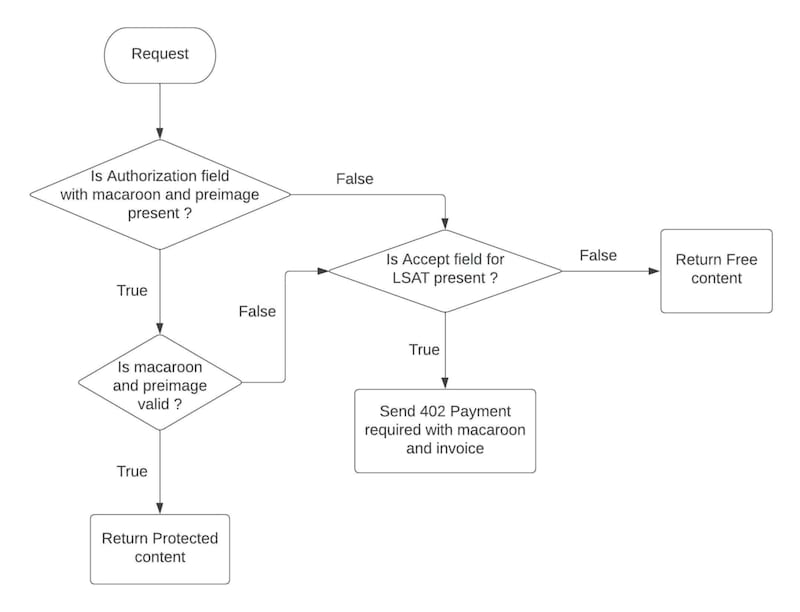5 releases (stable)
| new 1.3.0 | Mar 10, 2025 |
|---|---|
| 1.2.0 | Dec 27, 2024 |
| 1.1.0 | Nov 28, 2024 |
| 1.0.0 | Nov 26, 2024 |
| 0.1.0 | Oct 10, 2024 |
#11 in Magic Beans
177 downloads per month
49KB
848 lines
l402_middleware
A middleware library for rust that uses L402, formerly known as LSAT (a protocol standard for authentication and paid APIs) and provides handler functions to accept microtransactions before serving ad-free content or any paid APIs. It supports Lightning Network Daemon (LND), Lightning URL (LNURL), and Nostr Wallet Connect (NWC) for generating invoices.
Check out the Go version here: https://github.com/getAlby/lsat-middleware
The middleware:-
- Checks the preference of the user whether they need paid content or free content.
- Verify the L402 before serving paid content.
- Send macaroon and invoice if the user prefers paid content and fails to present a valid L402.
L402 Header Specifications
| Header | Description | Usage | Example |
|---|---|---|---|
| Accept-Authenticate | Sent by the client to show interest in using L402 for authentication. | Used when the client wants to explore authentication options under L402. | Accept-Authenticate: L402 |
| WWW-Authenticate | Sent by the server to request L402 authentication, providing a macaroon and a payment invoice. | Used when the client must pay or authenticate to access a resource. | WWW-Authenticate: L402 macaroon="MDAxM...", invoice="lnbc1..." |
| Authorization | Sent by the client to provide the macaroon and preimage (proof of payment) to access the resource. | Used by the client after payment or authentication to prove access rights. | Authorization: L402 <macaroon>:<preimage> |
Installation
Add the crate to your Cargo.toml:
[dependencies]
l402_middleware = "1.3.0"
By using the no-accept-authenticate-required feature, the check for the Accept-Authenticate header can be bypassed, allowing L402 to be treated as the default authentication option.
[dependencies]
l402_middleware = { version = "1.3.0", features = ["no-accept-authenticate-required"] }
Ensure that you create a .env file based on the provided .env_example and configure all the necessary environment variables.
Example
#[macro_use] extern crate rocket;
use rocket::serde::json::Json;
use rocket::serde::Serialize;
use rocket::http::Status;
use rocket::Request;
use dotenv::dotenv;
use std::env;
use std::sync::Arc;
use reqwest::Client;
use l402_middleware::{l402, lnclient, lnd, lnurl, nwc, middleware};
const SATS_PER_BTC: i64 = 100_000_000;
const MIN_SATS_TO_BE_PAID: i64 = 1;
const MSAT_PER_SAT: i64 = 1000;
#[derive(Serialize)]
#[serde(crate = "rocket::serde")]
pub struct FiatRateConfig {
pub currency: String,
pub amount: f64,
}
impl FiatRateConfig {
// Converts fiat amount to BTC equivalent in millisats. Customization possible for different API endpoints.
pub async fn fiat_to_btc_amount_func(&self) -> i64 {
// Return the minimum sats if the amount is invalid.
if self.amount <= 0.0 {
return MIN_SATS_TO_BE_PAID * MSAT_PER_SAT;
}
// API request to get BTC equivalent of the fiat amount.
let url = format!(
"https://blockchain.info/tobtc?currency={}&value={}",
self.currency, self.amount
);
match Client::new().get(&url).send().await {
Ok(res) => {
let body = res.text().await.unwrap_or_else(|_| MIN_SATS_TO_BE_PAID.to_string());
match body.parse::<f64>() {
Ok(amount_in_btc) => ((SATS_PER_BTC as f64 * amount_in_btc) * MSAT_PER_SAT as f64) as i64,
Err(_) => MIN_SATS_TO_BE_PAID * MSAT_PER_SAT,
}
}
Err(_) => MIN_SATS_TO_BE_PAID * MSAT_PER_SAT,
}
}
}
// Function to add caveats, can customize it based on authentication needs
fn path_caveat(req: &Request<'_>) -> Vec<String> {
vec![
format!("RequestPath = {}", req.uri().path()),
]
}
#[derive(Serialize)]
#[serde(crate = "rocket::serde")]
struct Response {
code: u16,
message: String
}
#[get("/")]
fn free() -> (Status, Json<Response>) {
let response = Response {
code: Status::Ok.code,
message: String::from("Free content"),
};
(Status::Ok, Json(response))
}
#[get("/protected")]
fn protected(l402_info: l402::L402Info) -> (Status, Json<Response>) {
let (status, message) = match l402_info.l402_type.as_str() {
l402::L402_TYPE_FREE => (Status::Ok, String::from("Free content")),
l402::L402_TYPE_PAYMENT_REQUIRED => (Status::PaymentRequired, String::from("Pay the invoice attached in response header")),
l402::L402_TYPE_PAID => (Status::Ok, String::from("Protected content")),
l402::L402_TYPE_ERROR => (
Status::InternalServerError,
l402_info.error.clone().unwrap_or_else(|| String::from("An error occurred")),
),
_ => (Status::InternalServerError, String::from("Unknown type")),
};
let response = Response {
code: status.code,
message,
};
(status, Json(response))
}
#[launch]
pub async fn rocket() -> rocket::Rocket<rocket::Build> {
// Load environment variables from .env file
dotenv().ok();
// Get LN_CLIENT_TYPE from the environment
let ln_client_type = env::var("LN_CLIENT_TYPE").expect("LN_CLIENT_TYPE not found in .env");
// Initialize LNClientConfig based on LN_CLIENT_TYPE
let ln_client_config = match ln_client_type.as_str() {
"LNURL" => lnclient::LNClientConfig {
ln_client_type,
lnd_config: None,
lnurl_config: Some(lnurl::LNURLOptions {
address: env::var("LNURL_ADDRESS").expect("LNURL_ADDRESS not found in .env"),
}),
nwc_config: None,
root_key: env::var("ROOT_KEY")
.expect("ROOT_KEY not found in .env")
.as_bytes()
.to_vec(),
},
"LND" => lnclient::LNClientConfig {
ln_client_type,
lnd_config: Some(lnd::LNDOptions {
address: env::var("LND_ADDRESS").expect("LND_ADDRESS not found in .env"),
macaroon_file: env::var("MACAROON_FILE_PATH").expect("MACAROON_FILE_PATH not found in .env"),
cert_file: env::var("CERT_FILE_PATH").expect("CERT_FILE_PATH not found in .env"),
}),
lnurl_config: None,
nwc_config: None,
root_key: env::var("ROOT_KEY")
.expect("ROOT_KEY not found in .env")
.as_bytes()
.to_vec(),
},
"NWC" => lnclient::LNClientConfig {
ln_client_type,
lnd_config: None,
lnurl_config: None,
nwc_config: Some(nwc::NWCOptions {
uri: env::var("NWC_URI").expect("NWC_URI not found in .env"),
}),
root_key: env::var("ROOT_KEY")
.expect("ROOT_KEY not found in .env")
.as_bytes()
.to_vec(),
},
_ => panic!("Invalid LN_CLIENT_TYPE. Expected 'LNURL' or 'LND'."),
};
// Initialize Fiat Rate Config
let fiat_rate_config = Arc::new(FiatRateConfig {
currency: "USD".to_string(),
amount: 0.01,
});
let l402_middleware = middleware::L402Middleware::new_l402_middleware(
ln_client_config.clone(),
Arc::new(move |_req: &Request<'_>| {
let fiat_rate_config = Arc::clone(&fiat_rate_config);
Box::pin(async move {
fiat_rate_config.fiat_to_btc_amount_func().await
})
}),
Arc::new(move |req: &Request<'_>| {
path_caveat(req)
}),
).await.unwrap();
rocket::build()
.attach(l402_middleware)
.mount("/", routes![free, protected])
}
Testing
Run cargo test to run tests.
Dependencies
~60–96MB
~1.5M SLoC
